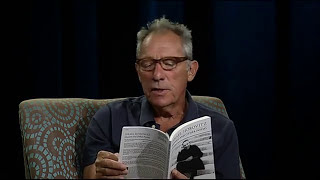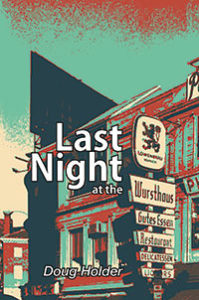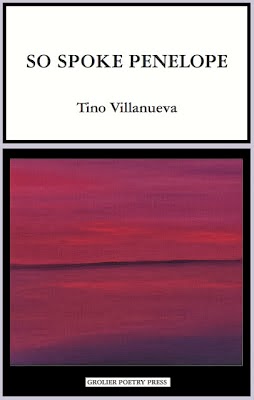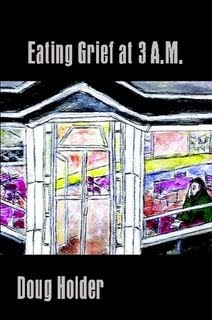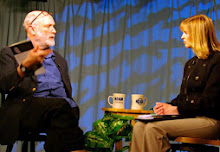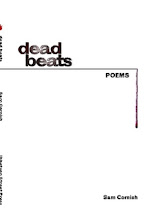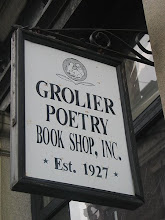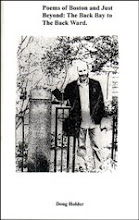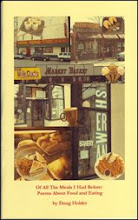Thursday, August 11, 2011
Mostly Redneck by Rusty Barnes
Mostly Redneck
Rusty Barnes
978-1-934513-32-3
Reviewed by Timothy Gager
I’ve known Rusty Barnes for close to eight years and I previously have read every one of the stories found in Mostly Redneck. After absorbing the book cover to cover, my first reaction was how heavy the plots, the prose and the words were. Also, don’t let the title fool you, as rednecks are stereotypically viewed as unintelligent, Barnes is a word craftsman of the finest kind. Language, pace, place, conflict and plot are carefully considered within each story and I found myself comparing the author to writers such as Andre Dubus II and Raymond Carver, masters I respect greatly.
Story wise, if you can take a punch in the face and be able to brag about it, this is where it’s at. Teen pregnant lovers kill the fathers of their babies. People party and have sex in the woods. Scores are settled in complete beat downs. Women compete against each other for men and their own self-worth. Men want women that are unavailable or they hit the road and never come back, leaving others destroyed.
Two of the stories which stood out for me were “Rick’s Song”, where the main character, Jimmy starts a new life, one torn apart from a car accident, by taking a crappy job at a Chinese restaurant. The other story I loved was, “O, Saddam”, a fine satire, completely different than the rest of the book. (Note: The mostly in Mostly Redneck). Here, a tour guide in Boston becomes involved with Saddam Hussein, who is hiding out as a nut vendor. Barnes creates a brilliant display of humor and heaviness intertwined within the set up.
Mostly Redneck, packs a wallop and as mention full of excellent writing. The denseness of subject matter was in stark contrast to the physical length of the book (153 pages) and the smallness of the font which were both, in my opinion, too small.
Wednesday, August 10, 2011
Sept 13, 2011: Newton Free Library Poetry Series--Mnookin, Mazur, Triedman, Helfgott-Hyett
(Click on Poster to Enlarge)
http://newtonfreelibraypoetryseries.blogspot.com
Newton Free Library 330 Homer Street Newton, Mass Poets of "Poets for Haiti" anthology to read..... Host: Doug Holder
Tuesday, August 09, 2011
Spared: Poems by Angie Ellis
Spared
Poems by Angele Ellis
Main Street Rag
Charlotte NC
Copyright © 2011 by Angele Ellis
ISBN: 978-1-59948-277-4
Softbound, 39 pages, $10
Review by Zvi A. Sesling
Ms. Ellis’s volume of poetry may be slim, but it is packed with punches from the opening poem “Mauches,” a polemic on ethnic prejudice that burns into any immigrant group which has contended with what Ms. Ellis experienced as a young girl. The same prejudice that exists today from liberal Massachusetts to gun-totin’ Arizona – being different or yourself does not conform to the norm.
In “Spared” good is bad, bad is good, escape (being spared) can turn nasty, can remind one of another person, while “On The Corniche, Beirut” shows the heartbreak of war,or civil war, how death comes up suddenly, how it never ends and leaves “the hole in the heart of the afternoon.”
Spared can also mean the reader is spared superfluous words, unneeded similes, unnecessary metaphors. Can it also mean being spared excess explanation or over dramatic verbiage resulting in a hollow ache inside.
While we are spared a lot in the relatively short poems, there is the feeling we would like to know more, but with good taste she lets us know in “World Of Glass” When language runs clear,/no explanation is desired.
About midway through the book you will find “Strike Sparks” an erotic homage to sex, to a lover any male would want to be, to be in that place of hot jungle love and sex, or is it all failure, all imagined, all hope or all true? Ah, Ms. Ellis can light the fire and our imagination does not want to put it out. Does she? Grab this small volume as you might her and hang on.
Poems by Angele Ellis
Main Street Rag
Charlotte NC
Copyright © 2011 by Angele Ellis
ISBN: 978-1-59948-277-4
Softbound, 39 pages, $10
Review by Zvi A. Sesling
Ms. Ellis’s volume of poetry may be slim, but it is packed with punches from the opening poem “Mauches,” a polemic on ethnic prejudice that burns into any immigrant group which has contended with what Ms. Ellis experienced as a young girl. The same prejudice that exists today from liberal Massachusetts to gun-totin’ Arizona – being different or yourself does not conform to the norm.
In “Spared” good is bad, bad is good, escape (being spared) can turn nasty, can remind one of another person, while “On The Corniche, Beirut” shows the heartbreak of war,or civil war, how death comes up suddenly, how it never ends and leaves “the hole in the heart of the afternoon.”
Spared can also mean the reader is spared superfluous words, unneeded similes, unnecessary metaphors. Can it also mean being spared excess explanation or over dramatic verbiage resulting in a hollow ache inside.
While we are spared a lot in the relatively short poems, there is the feeling we would like to know more, but with good taste she lets us know in “World Of Glass” When language runs clear,/no explanation is desired.
About midway through the book you will find “Strike Sparks” an erotic homage to sex, to a lover any male would want to be, to be in that place of hot jungle love and sex, or is it all failure, all imagined, all hope or all true? Ah, Ms. Ellis can light the fire and our imagination does not want to put it out. Does she? Grab this small volume as you might her and hang on.
Monday, August 08, 2011
Somerville’s Allegra Martin: part of an ‘Anthology’ of singers.
Somerville’s Allegra Martin: part of an ‘Anthology’ of singers.
By Doug Holder
The scene—a middle-aged community newspaper journalist—the Sherman Café in Union Square--one delectable oatmeal scone… a paper cup of strong coffee to wash it down, and add one mezzo-soprano—Allegra Martin. All but the last item I was familiar with. Allegra Martin, who joined me for a morning repast and an interview is a Winter Hill resident and a member of the singing group “Anthology.” According to the website of the group it consists of “… a professional quartet of enchanting women’s voices. Their expansive variety of music is presented with the fine polish of classical training and an effervescent whimsy that arises from an enthusiasm for all styles of performance.”
Martin met at one of my favorite haunts to discuss her group and their music. Anthology consists of: Vicky Reichert, who is a soprano, Anney Gilotte a soprano, and Michelle Vachon, a mezzo-soprano, and Martin, a mezzo-soprano. All four of these accomplished singers live in Somerville.
Martin, a native of Lexington, Mass. told me that she naturally gravitated to Somerville. She smiled: “It’s a great town. Not too expensive. There are many of my peers here--fellow geeks, musicians, and a strong geek culture that includes gaming, sci-fi groups that feed their obsessions at the Diesel Café in Davis Square.” (Where Martin stops by now and then), she said.
“Anthology” is a cappella group so they do their stuff without musical accompaniment. Their range is impressive; they cover the waterfront of hot jazz, classical, renaissance polyphony, world folk traditions, and incorporate the works of contemporary local Boston composers. Martin listed Erin Huelkskamd and Michael Veloso as a couple of local composers the group admires.
Martin, like many Somerville artists works several jobs to keep her going. One that caught my interest was her work with the Urban Voices Program. This program was started by the Met Opera in New York City—and it has spread to Boston. It serves schools that don’t have a music program. Martin goes to the Mission Hill/Roxbury School in Boston and teaches kids K to 5.
Martin, who got her undergraduate degree from Williams College in Physics and Music, thought about engineering at one point but realized music was her primary interest. She teaches at Lassell College in Newton, Mass—where she hopes to grow a seminal music program.
The other members of this band of musicians and friends work as voice teachers, choral directors, and other gigs to keep in their field.
Allegra Martin is a hustler, and has to worry about the next gig, the monthly health insurance payment—you name it. But she is hopeful, and with good reason, that things will move to a more stable lifestyle, and she will be able to follow her passion in the years to come.
For more information go to: http://anthologyvoices.com
Sunday, August 07, 2011
Forced Continuities by Miriam Walsh
Forced Continuities by Miriam Walsh
Reviewed by Adrienne Drobnies
My first reaction to this book is either that the continuities are too forced, or not forced enough. On the one hand, it seems a journal of everything that cropped up in the poet’s mind, and interesting as much of that is, much of it also felt superfluous and inadequately revised. On the other hand, the seeming need for the poet to document everything in her experience made the poetry seem too forced, as though no random thought could go unrecorded. Nonetheless, there is a sense of abundance or plenitude to the book, some original language, and some great titles: “mating ritual,” “optivore,” “decoherence,” “lazuline,” “utopiaries.” The references to mathematical and scientific phenomena were engaging elements to the work (e.g., “Wigner’s Friend” – recalling a thought experiment by Schrodinger involving his hypothetical cat and friend, the collapse of the wave function in quantum mechanics, and the mind-body problem):
“The quantum
plays as fireflies
and my hairs
stand in reverence
to their electricity
against the night.”
I would prefer though that she use language that refers more precisely to the firefly’s bioluminescence rather than use what seems like an unconsidered word: “electricity.”
There are some nice images in the work, e.g.,“umbrella lidded eyes.”
I am most attracted to the poems that stress the link between personal emotional and universal experiences of wonder.
“I place
my hand upon your chest
to somehow
reset myself
to the rhythm there…
my lips pressing
upon your temple
here
I found a place
to worship.”
The author is also a visual artist, and the interesting cover and arrangement of the words on the page attest to her skill. The hallucinogenic quality of the cover reflects a similar tone in the poetry. There is, however, too much exhortation and philosophizing for my tastes. The title poem on the back cover says:
“The moment comes and we must follow, though it makes no guarantee that those that follow will be any easier. For all our poetry and hope, sometimes life is just forced continuity.” There is much to enjoy, some to dazzle, but too much of the forced for me in Walsh’s book.
***Adrienne Drobnies received her doctorate in chemistry from the University of California, Berkeley and now work as a research project manager at the Genome Sciences Centre of the British Columbia Cancer Agency. Her poetry has appeared in Canadian literary magazines, including Scrivener, NeWest Review, Waves, Poetry Canada Review, Poetry Toronto. Some of my poems have been included in anthologies New Voices (Mosaic Press 1984), From Sinai to the Shtetl and Beyond: Where is Home for the Jewish Writer? (Hamilton Jewish Literary Festival 2009), and emerge (Simon Fraser University Writer’s Studio 2009).
********
Subscribe to:
Posts (Atom)







